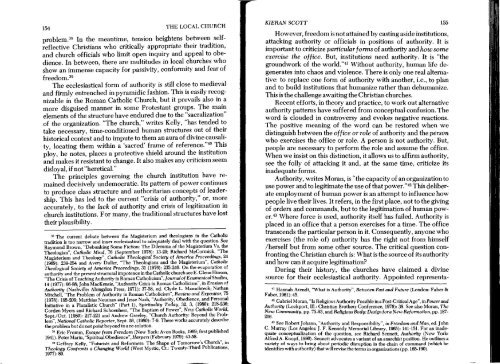The Local Church as an Ecology of Human Development - Fordham ...
The Local Church as an Ecology of Human Development - Fordham ...
The Local Church as an Ecology of Human Development - Fordham ...
- No tags were found...
You also want an ePaper? Increase the reach of your titles
YUMPU automatically turns print PDFs into web optimized ePapers that Google loves.
154 THE LOCAL CHURCHproblem.38 In the me<strong>an</strong>time, tension heightens between selfreflectiveChristi<strong>an</strong>s who critically appropriate their tradition,<strong>an</strong>d church <strong>of</strong>ficials who limit open inquiry <strong>an</strong>d appeal to obedience.In between, there are multitudes in local churches whoshow <strong>an</strong> immense capacity for p<strong>as</strong>sivity, conformity <strong>an</strong>d fear <strong>of</strong>freedom. 39<strong>The</strong> ecclesi<strong>as</strong>tical form <strong>of</strong> authority is still close to medieval<strong>an</strong>d firmly entrenched in pyramidic f<strong>as</strong>hion. This is e<strong>as</strong>ily recognizablein the Rom<strong>an</strong> Catholic <strong>Church</strong>, but it prevails also in amore disguised m<strong>an</strong>ner in some Protest<strong>an</strong>t groups. <strong>The</strong> mainelements <strong>of</strong> the structure have endured due to the "sacralization"<strong>of</strong> the org<strong>an</strong>ization. "<strong>The</strong> church," writes Kelly, "h<strong>as</strong> tended totake necessary, time-conditioned hum<strong>an</strong> structures out <strong>of</strong> theirhistorical context <strong>an</strong>d to impute to them <strong>an</strong> aura <strong>of</strong> divine causality,locating them within a 'sacred' frame <strong>of</strong> reference."4o Thisploy, he notes, places a protective shield around the institution<strong>an</strong>d makes it resist<strong>an</strong>t to ch<strong>an</strong>ge. It also makes <strong>an</strong>y criticism seemdisloyal, if not "heretical."<strong>The</strong> principles governing the church institution have remaineddecisively undemocratic. Its pattern <strong>of</strong> power continuesto produce cl<strong>as</strong>s structure <strong>an</strong>d authoritari<strong>an</strong> concepts <strong>of</strong> leadership.This h<strong>as</strong> led to the current "crisis <strong>of</strong> authority," or, moreaccurately, to the lack <strong>of</strong> authority <strong>an</strong>d crisis <strong>of</strong> legitimation inchurch institutions. For m<strong>an</strong>y, the traditional structures have losttheir plausibility.38 <strong>The</strong> current debate between the Magisterium <strong>an</strong>d theologi<strong>an</strong>s in the Catholictradition is too narrow <strong>an</strong>d inner ecclesi<strong>as</strong>tical to adequately deal with the question. SeeRaymond Brown, "Debunking Some Fiction: <strong>The</strong> Dilemma <strong>of</strong> the Magisterium Vs. the<strong>The</strong>ologi<strong>an</strong>", Catholic Mind, 76 (September 1978): 13-29; Richard McCormick, "<strong>The</strong>Magisterium <strong>an</strong>d <strong>The</strong>ology", Catholic <strong>The</strong>ological Society <strong>of</strong> America Proceedings, 24(1969): 239-254 <strong>an</strong>d Avery Duller, "<strong>The</strong> <strong>The</strong>ologi<strong>an</strong>s <strong>an</strong>d the Magisterium", Catholic<strong>The</strong>ological Society <strong>of</strong> America Proceedings, 31 (1976): 235-246. On the evaporation <strong>of</strong>authority <strong>an</strong>d the present structural impotence in the Catholic church see E. Glenn Hinson,"<strong>The</strong> Crisis <strong>of</strong> Teaching Authority in Rom<strong>an</strong> Catholicism", ] oumal <strong>of</strong> Ecumenical Studies,14 (1977): 66-88; John MacKensie, "Authority Crisis in Rom<strong>an</strong> Catholicism", in Erosion <strong>of</strong>Authority (N<strong>as</strong>hville: Abingdon Press, 1971): 37-58, ed. Clyde L. M<strong>an</strong>schreck; Nath<strong>an</strong>Mitchell, "<strong>The</strong> Problem <strong>of</strong> Authority in Rom<strong>an</strong> Catholicism", Review <strong>an</strong>d Expositor, 75(1978): 195-209; Matthi<strong>as</strong> Neum<strong>an</strong> <strong>an</strong>d Jesse N<strong>as</strong>h, "Authority, Obedience, <strong>an</strong>d PersonalInitiative in a Pluralistic <strong>Church</strong>" (Part 1), Spirituality Today, 32, 3, (1980): 218-236;Gorden Myers <strong>an</strong>d Richard Schoenherr, "<strong>The</strong> Baptism <strong>of</strong> Power", New Catholic World,Sept./Oct. (1980): 217-221 <strong>an</strong>d Andrew Greeley, "<strong>Church</strong> Authority: Beyond the Problem",National Catholic Reporter, Sept. 26, (1980): 7-9. <strong>The</strong>se works accurately describethe problem but do not point beyond to are-solution.39 Eric Fromm, Escape from Freedom (New York: Avon Books, 1969; first published1941). Peter Marin, "Spiritual Obedience", Harpers (February 1979): 43-58.40 Geffrey Kelly, "Futurists <strong>an</strong>d Reformers: <strong>The</strong> Shape <strong>of</strong> Tomorrow's <strong>Church</strong>", in<strong>The</strong>ology Confronts a Ch<strong>an</strong>ging World (West Mystic, Ct.: Twenty-Third Publications,1977):80.KIERAN SCOTTHowever, freedom is not attained by c<strong>as</strong>ting <strong>as</strong>ide institutions,attacking authority or <strong>of</strong>ficials in positions <strong>of</strong> authority. It isimport<strong>an</strong>t to criticize particular forms <strong>of</strong> authority <strong>an</strong>d how someexercise the <strong>of</strong>fice. But, institutions need authority. It is "thegroundwork <strong>of</strong> the world."41 Without authority, hum<strong>an</strong> life degeneratesinto chaos <strong>an</strong>d violence. <strong>The</strong>re is only one real alternative:to replace one form <strong>of</strong> authority with <strong>an</strong>other, i.e., to pl<strong>an</strong><strong>an</strong>d to build institutions that hum<strong>an</strong>ize rather th<strong>an</strong> dehum<strong>an</strong>ize.This is the challenge awaiting the Christi<strong>an</strong> churches.Recent efforts, in theory <strong>an</strong>d practice, to work out alternativeauthority patterns have suffered from conceptual confusion. <strong>The</strong>word is clouded in controversy <strong>an</strong>d evokes negative reactions.<strong>The</strong> positive me<strong>an</strong>ing <strong>of</strong> the word c<strong>an</strong> be restored when wedistinguish between the <strong>of</strong>fice or role <strong>of</strong> authority <strong>an</strong>d the personwho exercises the <strong>of</strong>fice or role. A person is not authority. But,people are necessary to perform the role <strong>an</strong>d <strong>as</strong>sume the <strong>of</strong>fice.When we insist on this distinction, it allows us to affirm authority,see the folly <strong>of</strong> attacking it <strong>an</strong>d, at the same time, criticize itsinadequate forms.Authority, writes Mor<strong>an</strong>, is "the capacity <strong>of</strong> <strong>an</strong> org<strong>an</strong>ization touse power <strong>an</strong>d to legitimate the use <strong>of</strong> that power."42 This deliberateemployment <strong>of</strong> hum<strong>an</strong> power is <strong>an</strong> attempt to influence howpeople live their lives. It refers, in the first place, not to the giving<strong>of</strong> orders <strong>an</strong>d comm<strong>an</strong>ds, but to the legitimation <strong>of</strong> hum<strong>an</strong> power.43 Where force is used, authority itself h<strong>as</strong> failed. Authority isplaced in <strong>an</strong> <strong>of</strong>fice that a person exercises for a time. <strong>The</strong> <strong>of</strong>ficetr<strong>an</strong>scends the particular person in it. Consequently, <strong>an</strong>yone whoexercises (the role <strong>of</strong>) authority h<strong>as</strong> the right not from himself/herself but from some other source. <strong>The</strong> critical question confrontingthe Christi<strong>an</strong> church is: What is the source <strong>of</strong> its authority<strong>an</strong>d how c<strong>an</strong> it acquire legitimation?During their history, the churches have claimed a divinesource for their ecclesi<strong>as</strong>tical authority. Appointed representa41 H<strong>an</strong>nah Arendt, "What is Authority", Between P<strong>as</strong>t <strong>an</strong>d Future (London: Faber &Faber, 1961): 45.42 Gabriel Mor<strong>an</strong>, "Is Religious Authority Possible in a Post-Critical Age", in Power <strong>an</strong>dAuthOrity (Lockport, Ill.: Christi<strong>an</strong> Brothers Conference, 1976): 38. See also Mor<strong>an</strong>, <strong>The</strong>New Community, pp. 75-93, <strong>an</strong>d Religious Body: Design fora New Reformation, pp.187206.43 See Robert Joh<strong>an</strong>n, "Authority <strong>an</strong>d Responsibility", in Freedom <strong>an</strong>d M<strong>an</strong>, ed. JohnC. Murray (Los Angeles: J. F. Kennedy Memorial Library, 1965): 141-151. For <strong>an</strong> inadequateconceptualization <strong>of</strong> the question, see Richard Sennett, Authority (New York:Alfred A. Knopf, 1980). Sennett advocates a vari<strong>an</strong>t <strong>of</strong> <strong>an</strong> <strong>an</strong>archist position. He outlines avariety <strong>of</strong> ways to bring about periodic disruption in the chain <strong>of</strong> comm<strong>an</strong>d (which heidentifies with authority) that will revise the terms in org<strong>an</strong>izations (pp. 165-190).155
















